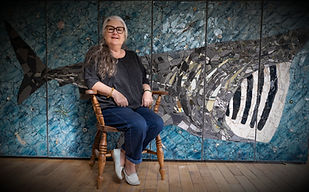INTERDEPENDENCE
A three metre long mosaic of a basking shark surrounded by plankton in six panels
Supported by Culture Vannin

This mosaic has been created to provide a new way of sharing the diverse marine life we are lucky to have on the
Isle of Man and the importance to respect all aspects of an increasingly fragile ecosystem.
I have included local stone from Pooil Vaaish, found objects, and re-cycled glass in the making of the piece.
I have always wanted to give something back to The Isle of Man where I was born, brought up and taught by the great Norman Sayle. I am so happy to have been given the opportunity by Culture Vannin to produce something on a large scale to leave as a legacy and celebration of my homeland.
Kimmy McHarrie 2023

Video of the making.
© Kimmy McHarrie 2023
Access Videos
Audio Description
Captioned
Short Video
The Basking Shark
The basking shark is the second largest fish in our seas,The average length of an adult is around 8m and weighing over 4000 kilos. Despite their large size and threatening appearance basking sharks are not aggressive and are harmless to humans.
Basking sharks only feed on zooplankton which they filter out of the water, swimming slowly back and forth with their mouths wide open. They are commonly seen in the summer, when they arrive in British waters and are often seen off the Isle of Man.
They are currently fished mainly for their fins (for shark fin soup) while other parts such as cartilage are also used in traditional Chinese medicine and as an aphrodisiac in Japan, further adding to demand.
Only 20 years ago basking sharks were common in Manx waters. Literally hundreds of basking sharks gathered along the west coast each summer putting the Isle of Man on the map as a basking shark hot-spot.
Over recent years there has been a huge decline in basking shark numbers. In 2009 there were around 500 sightings submitted but by 2019 that had fallen to 50. Since then numbers have dropped again, with only 8 sharks reported in 2021.
As a result of rapidly declining numbers, the basking shark has been protected in some territorial waters and trade in its products is restricted in many countries under CITES. Among others, it is fully protected in the United Kingdom.
CITES is a multilateral treaty to protect endangered plants and animals from the
threats of international trade



